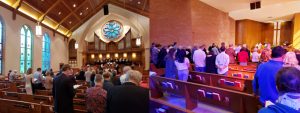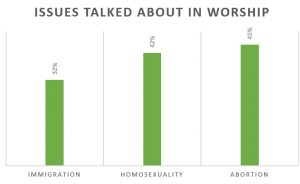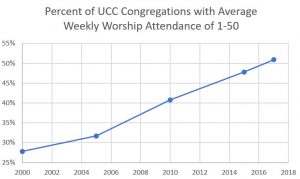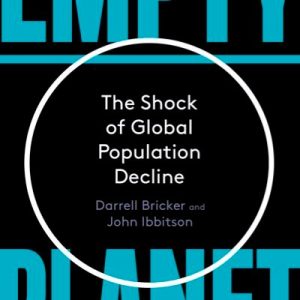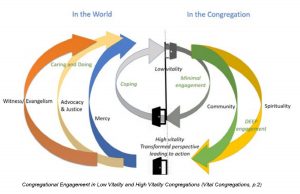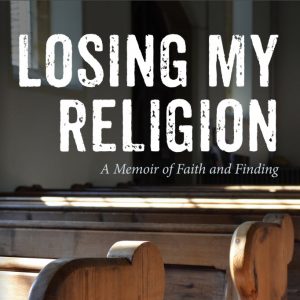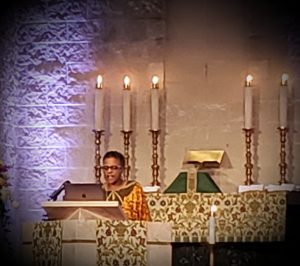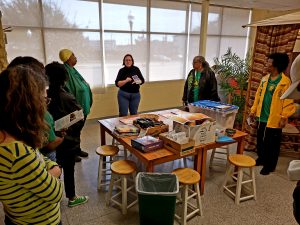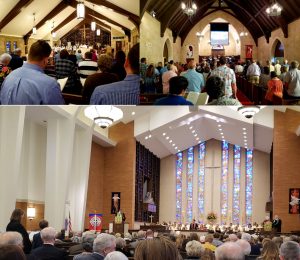This time around our search for a church was supposed to be relatively easy because we decided to only consider a small geographical areavisit Mainline Protestant congregations (and those largely aligned with Mainline theology) Our relatively modest attempt has grown a few times: Plan A: 10 congregationsPlan B: 13 congregationsPlan C: 15 congregations (still far smaller than our last search that included 36 congregations!) Plan C When we set out for our original search for Read More …
Current Issues & Church (#1780)
According to a recent Public Religion Research Institute survey of adults who attend religious services at least once or twice a month, most people never hear clergy speak about current issues from the pulpit. More specifically, the percentage who have heard clergy speak about a given current issue is Immigration: 32%Homosexuality: 42%Abortion: 45% So What? Something is wrong when the church is silent about current issues. People should not be able to regularly attend worship Read More …
Visiting 50+ Churches in Dallas – Fort Worth (#1779)
Since relocating to the Dallas - Fort Worth metropolitan area in September 2015, I've worshipped in 52 different congregations. Denomination The vast majority (87%) of my visits have been to congregations in Mainline denominations. A complete list of denominational affiliations follows: So What? When I share the number of churches I've visited in recent years the first question I'm usually asked is "why?" My answer is always the same: "I searched for a church on relocating Read More …
Majority of UCC Congregations Worship 50 or Fewer (#1778)
The percentage of all congregations in the United Church of Christ with average worship attendance of 50 people or less has been increasing since 2000. During that time the percentage nearly doubled from a little more than 1 in 4 congregations (27.8%) to 1 in 2 (50.9%). During the same time period, the largest congregations in the United Church of Christ (average worship attendance of 400+) declined from 1 in 50 (1.9%) to 1 in 200 (0.6%). So What? The dual trends within the Read More …
Book Recommendations – Bonus List for February 2019 (#1777)
Over the last few years, I've typically shared a list of book recommendations on a monthly basis. Since I didn't read many books published in 2019 until January I didn't share my first list on the year until the first day of February. With so many wonderful books being published early in 2019, I've decided to share a second February list - a bonus list. Over the last two weeks, I read several new books worth recommending. The following volumes were all published in 2019. (5.0) Empty Read More …
Spiritually Vital Congregations (#1776)
Is spiritual vitality the same across denominations and even religions or does it look differently within each of these contexts? Common Ground According to the Faith Communities Today American Congregations 2018 report titled Vital Congregations, there is significant overlap in what makes a faith community a spiritually vital congregation. Authored by Linda Bobbitt, creator and manager of the Congregational Vitality Project, this new research builds on the Faith Read More …
Book Recommendations – February 2019 (#1775)
Reading new books is something I've done with regularity for the better part of a decade. This list features the best books I read during January that were published in 2019. (5.0) Losing My Religion: A Memoir of Faith and Finding by William C. Mills (Resource Publications, 2019) (4.5) The Right Story: A Brief Guide to Changing the World by Bernadette Jiwa (Perceptive Press, 2019) (4.0) Twelve Lies That Hold America Captive: And the Truth That Sets Us Read More …
Be the Book (#1774)
In her sermon this morning at Cathedral of Hope UCC, Bishop Yvette Flunder called on those present to follow in the Way of Jesus - the very Jesus who read the from the Book of Isaiah, sat down, and became the Book (Luke 4:14-21). Jesus' Reading Isaiah 61 (NRSV) begins with these words: The spirit of the Lord God is upon me, because the Lord has anointed me; he has sent me to bring good news to the oppressed, to bind up the brokenhearted, to proclaim liberty to the captives, and release Read More …
TCT MLK Day of Service 2019 (#1773)
I spent the morning participating in the ninth annual MLK Day of Service - #MLKTCT - organized by Tarrant Churches Together. As a first timer, I was encouraged by the diversity of faith communities represented, impressed by the breadth of service opportunities, and inspired to continue Dr. King's work in and beyond my community. Worship Baker Chapel AME was filled to capacity for the hour long service that set the tone for the day while also inviting those present to capture or Read More …
Search for a Church 2.0 – Pastoral Transitions (#1772)
In April 2018, my wife and I started what I've been calling Search for a Church 2.0. We visited five congregations by May, and another five by June. By August we expanded our visiting to include three more congregations. Over the last several months we've focused our time in just a few of these congregations. Pastoral Transitions During our nine month search, three of the thirteen congregations have undergone or announced that they will soon undergo a change Read More …
